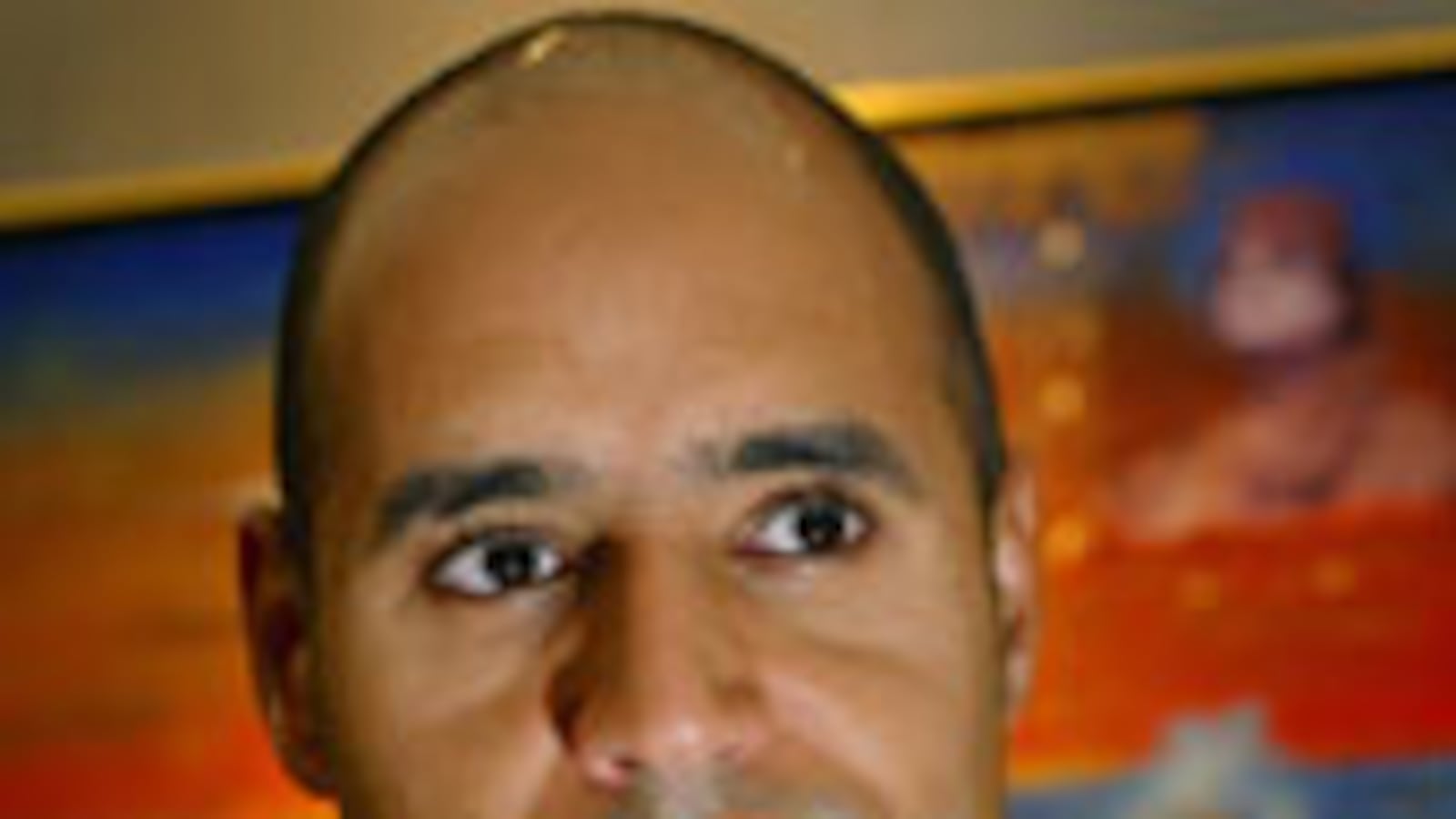
Saif al Islam al Gaddafi, son and heir apparent to Libyan dictator Col. Muammar Gaddafi, is the wealthy bachelor at the center of the Lockerbie uproar. His successful effort to gain an early release for a convicted mass murderer, a Libyan intelligence officer sentenced to life in prison, has scandalized U.S. officialdom, threatens to topple the Scottish government, and has already damaged embattled British Prime Minister Gordon Brown.
The 37-year-old Gaddafi helped facilitate the freedom of Abdel Basset Ali al-Megrahi, who placed an explosive device aboard Pan Am Flight 103 in December 1988. Gaddafi accompanied the bomber, who is said to be dying of prostate cancer, from Scotland to Libya on his father’s private jet, and presided over a hero’s welcome that outraged the West. It was a PR setback for a once-rogue nation that only recently has won acceptance in the international community by giving up weapons of mass destruction, renouncing terrorism, and vowing to fight al Qaeda.
“He was clearly very comfortable with investment bankers and private-equity types,” said someone who had breakfast with Gaddafi last year, “and he changed a lot of the conventional wisdom—it wasn’t your standard take on the Arab world.”

Yet Saif has long been a popular figure in London society—a babe-magnet and culture vulture who boasts advanced degrees from the London School of Economics, has a serious knowledge of art, heads up a charitable foundation, and is an architect by training. Last November, he even made a splash in Manhattan during a trade-promoting trip to the United States as an informal representative of the Libyan regime. Young Gaddafi impressed the New Yorkers he met at Council on Foreign Relations breakfast as thoughtful, soft-spoken, and witty.
“He was clearly very comfortable with investment bankers and private-equity types in the meeting, and he changed a lot of the conventional wisdom—it wasn’t your standard take on the Arab world,” says a participant at the breakfast. “It was a different point of view from the Arab nationalism and Third World politics of his father’s generation of leaders. He represented a real change.” Although Saif is widely considered the most presentable Gaddafi to potentially succeed his father, who is only 67 and apparently robust, “he explicitly ruled that out,” says the breakfast attendee—though it wasn’t clear if Saif’s disclaimer was just for appearances. “This latest situation does represent a step backward for Libya and for Saif,” says the breakfast participant, noting that the flap will have a negative impact on Col. Gaddafi’s visit to the United Nations scheduled for next month.
During Saif’s recent New York visit, his friend Nat Rothschild, hedge-funder and scion of the British banking family, opened his fabulous Greenwich Village townhouse to the likes of Eva Mendes, Taki Theodoracopulos, and Ivanka Trump for a party in the Libyan’s honor.
• Lloyd Grove: NJ Congressman Tells Gaddafi to Keep Out• The Daily Beast's Andrew Neil: Why the Lockerbie Bomber Was FreedSo who is Saif Gaddafi? Years ago, he offered some clues in a statement submitted to the British high court as part of a successful libel suit against The Telegraph (which had accused him of money-laundering among other sins).
“In terms of spare time, my interests include my pet tigers,” he recounted. “I have had them since they were tiny cubs. I love playing with my tigers, although they can sometimes be a little rough! ... I also enjoy falconry, and have some falcons of my own. … I also like reading. I read widely but concentrate mainly on books about history, politics, economics, and religion. … I also enjoy painting when I can find time, and have been having painting lessons for a long time, since school. I paint mainly with oils, and paint in a particular style which combines realism, surrealism, impressionism, and collage in each work. … Although I am a strong believer in the teachings of Islam, and hope that I am a good Muslim, I think that I have quite modern views on things such as the role of women in our society. I strongly believe that women should be treated as equals of men, and think that it is essential that my country recognizes this if it is to do well in the future.”
Saif hobnobs with English toffs, dates models and actresses—as of last year, his girlfriend was an Israeli soap star—and boasts connections high up in the U.K. government, just as he does in regimes throughout the Arab world. He seems especially chummy with Peter Mandelson, aka Lord Mandelson, the powerful business secretary and president of the Board of Trade. Gaddafi’s repeated lobbying of Mandelson for the bomber’s early release from a Scottish prison—while both were guests earlier this month at the Rothschild estate in Corfu—has been Topic A on Fleet Street.
In one of the many ironies surrounding this case, Gaddafi is personally acquainted with the horror of bombings. Two years before Pan Am’s Boeing 747 blew up over Lockerbie, Scotland—killing all 259 people aboard, including 189 Americans, plus 11 on the ground—Saif nearly died himself when President Ronald Reagan ordered a massive airstrike on Libya in April 1986.
“I was only 14 at the time and my family were all together in our home in Tripoli,” Gaddafi said in a statement to the British court. “One night, without any warning, the bombers came and, for five minutes, rained rockets down on us. I was woken up by loud crashing sounds and explosions. It was absolutely terrifying. Our house had been directly hit. I knew that we had to go to a shelter which had been built within the house. Sadly, some of my brothers and sisters were too young to know what to do, and they became trapped in one part of the house when a corridor collapsed. They were stuck there until the rescue services arrived, and, when we dug them out we found that Hannah, my youngest sister, had died. She was just four years old.”
One would think such a harrowing experience would have given young Gaddafi some sympathy for the grief-stricken families of Pan Am 103’s victims. Apparently not. “The negotiation with them, it was very terrible and very materialistic and was very greedy,” he complained last August about Libya’s $1.5 billion in reparations to the families—one of the conditions of normalized relations with Britain and the United States. In the television interview with the BBC, Gaddafi added in fluent but accented English: “They were asking for more money and more money and more money. … I think they were very greedy and I think they were trading with the blood of their sons and daughters."
Understandably, perhaps—given the human-rights abuses associated with his father’s 40-year reign over the oil-rich country (human trafficking, torture, arbitrary arrest, political prisoners held indefinitely without charges, and so on)—Saif betrayed a deep cynicism about politics and international relations.
“It’s a game,” he told his BBC interviewer with a shrug and a grin. "Yes, we wrote a letter to the [United Nations] Security Council saying we are responsible for the acts of our employees... [B]ut it doesn't mean that we did it in fact. … I admit that we played with words—we had to. What can you do? Without writing that letter we would not be able to get rid of sanctions."
It is precisely Gaddafi’s penchant for blunt-spoken realpolitik that has landed his Brit-politician friends, particularly Mandelson, in a world of hurt. In an appearance on Libyan state television, taped during the flight from Scotland to Tripoli, Saif claimed that the British desire for Libyan oil played a key role in the Scottish decision to grant the bomber a compassionate early release. “You were on the table in all commercial, oil, and gas agreements that we supervised in that period,” Saif told the freed man. “You were on the table in all British interests when it came to Libya, and I personally supervised this matter.”
Mandelson and other Labour government officials have been at pains to deny the oil-for-freedom scenario. “It’s not only completely wrong to make such a suggestion, it’s also quite offensive,” Mandelson said over the weekend, when he was accosted by a camera crew as he left the hospital where he’d just had prostate surgery. “The issue of the prisoner’s release was entirely a matter for the Scottish justice minister. [There was] no agreement between the Libyan government and the British government.”
It is unlikely that Saif Gaddafi will appear as a witness in the investigative hearings that are undoubtedly to come.
Lloyd Grove is editor at large for The Daily Beast. He is also a frequent contributor to New York magazine and was a contributing editor for Condé Nast Portfolio. He wrote a gossip column for the New York Daily News from 2003 to 2006. Prior to that, he wrote the Reliable Source column for The Washington Post, where he spent 23 years covering politics, the media, and other subjects.






